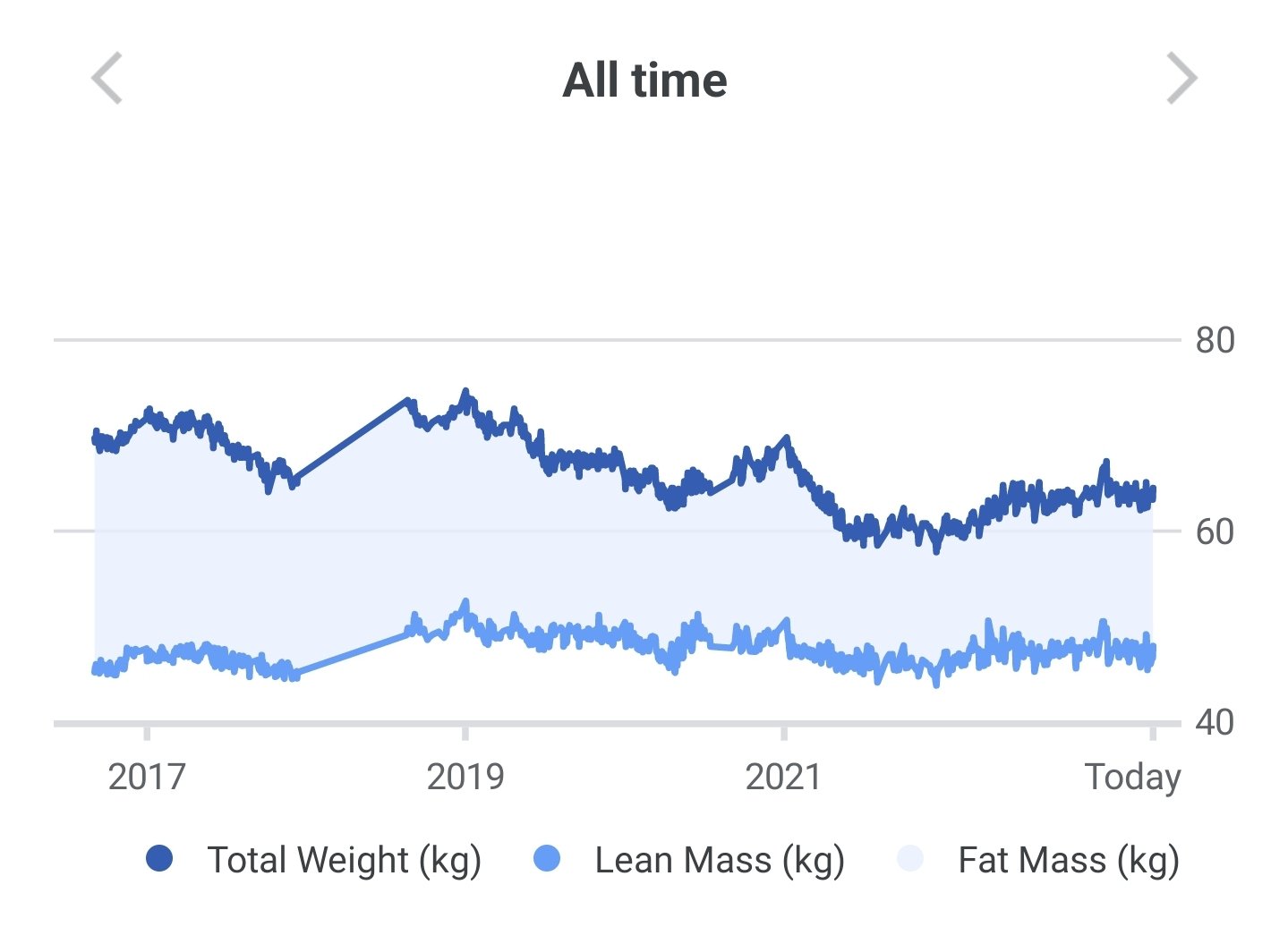The hidden culprit
It's no secret that we all fall into the trap of making unhealthy choices. It's a curious phenomenon, especially considering that nobody wants to suffer through illness or deal with the consequences of poor health. Yet, despite our best intentions, we often find ourselves engaging in behaviors that don't benefit us in the long run.
In this post, I’ll dive into the hidden culprit for a lot of our struggles: why we can’t lose weight and give up, why we feel pain and cannot workout, why we have digestive issues despite sometimes eating healthy, why we might allow a fertile land for chronic diseases that are becoming very common, and more: chronic inflammation.
Do I have chronic inflammation?
You might wonder…
Chronic inflammation can be a silent saboteur, wreaking havoc on our bodies without us even realizing it. To identify whether we're experiencing chronic inflammation, we need to pay close attention to the signals our bodies are sending us. Common symptoms include constant fatigue, body pain, and digestive issues. If you notice any of these signs, consult your doctor and discuss the possibility of inflammation.
Medical tests that can help detect inflammation include:
C-reactive protein (CRP) tests: These blood tests measure the level of CRP, a protein produced by the liver that increases in response to inflammation.
Erythrocyte sedimentation rate (ESR) tests: Also known as "sed rate" tests, these blood tests measure the rate at which red blood cells settle at the bottom of a test tube, which can indicate the presence of inflammation.
Specific antibody tests: These tests can identify the presence of specific antibodies that may be linked to autoimmune conditions, which often involve chronic inflammation.
Bonus: Food sensitivities tests - Not necessarily just allergies, but any food sensitivities. There are different ways to check what your body consumes too much energy to process. My favorite way of testing is with the Bicom bioresonance machine. You can find therapists that provide analysis and treatments with this machine in a lot of places around the globe.
Before we dive further, I want to show you something that shook all my beliefs about health and diets. Look at my weight data below.
In 2019 and 2020 I tried all sorts of diets to lose weight, like keto. It was hard.
At the beginning of 2021, I focused on my wellbeing instead of my weight, bothered by all the bloating and brain fog. I did the food sensitivities test and followed a diet excluding the more harmful ones - which to my surprise also included also foods that are generally healthy, like olive oil, peaches, lettuce, etc. Additionally, I removed alcohol consumption, and I had my last meal a few hours before sunset. I didn’t do anything else - no special diet, no workout.
The outcome: Brain fog was gone in 3 days. Bloating was gone in a week. I had more and more energy. And, surprisingly, I lost about 10kg in 3 months, day by day, and it stayed like that without much effort for a year, until I got into some pathogens problems that raised inflammation again.
That’s when I discovered I had a lot of chronic inflammation without even knowing it.
So I encourage you to listen to signals in your body, and if you have brain fog, digestion problems, and pain, keep an eye on this and try to solve it.
Tackling chronic inflammation can have a profound impact on your overall health and well-being. Some of the benefits you may experience include:
Weight loss: Reducing inflammation can help your body release excess weight, especially if the inflammation is connected to food sensitivities or poor diet choices.
Increased energy: As your body rids itself of inflammation, you may find that your energy levels improve, allowing you to enjoy life more fully.
Reduced pain: Chronic inflammation often contributes to pain and discomfort. By addressing the root cause, you can experience significant relief from aches and pains.
Lower risk of chronic diseases: Inflammation is linked to numerous chronic diseases, including heart disease, diabetes, and certain types of cancer. By managing inflammation, you may be able to reduce your risk of developing these serious health conditions.
How to lower chronic inflammation?
1. Pay special attention to food sensitivities
Food sensitivities can play a significant role in chronic inflammation. Identifying and addressing these sensitivities is a crucial step in managing inflammation and improving overall health. Common culprits include gluten, dairy, soy, and processed foods. Try the Bicom bioresonance machine I recommended with a therapist, or simply experiment with elimination diets to pinpoint triggers and adjust your diet accordingly.
2. Add some herbs to your routine
Incorporating herbal supplements into your daily routine can provide natural support in the fight against inflammation. Some popular anti-inflammatory herbs and supplements include:
Turmeric: This golden spice contains curcumin, a potent anti-inflammatory compound. You can consume turmeric in capsule form or incorporate it into your meals.
Ginger: With its powerful anti-inflammatory properties, ginger can be taken as a supplement or brewed into a warming tea.
Green tea: Rich in antioxidants and anti-inflammatory compounds, green tea can be a soothing and beneficial addition to your daily routine.
Spirulina: This blue-green algae is a nutritional powerhouse, packed with antioxidants, vitamins, and minerals that can help combat inflammation. You can add spirulina powder to smoothies, juices, or even sprinkle it on salads for an extra health boost.
Omega-3 fatty acids: Found in fish oil, flaxseed, and chia seeds, omega-3 fatty acids have been shown to have potent anti-inflammatory effects. You can incorporate these healthy fats into your diet through supplements or by eating foods rich in omega-3s.
Quercetin: This plant-based flavonoid is known for its antioxidant and anti-inflammatory properties. Found in foods such as apples, onions, and berries, quercetin can also be taken as a supplement to help reduce inflammation.
Bromelain: Derived from pineapple stems, bromelain is a natural enzyme with powerful anti-inflammatory and pain-relieving properties. You can find bromelain in supplement form, or incorporate pineapple into your diet to reap its benefits.
Resveratrol: A potent antioxidant found in red grapes, blueberries, and dark chocolate, resveratrol has been shown to possess anti-inflammatory properties. You can enjoy resveratrol-rich foods in moderation or take it in supplement form for added support.
Black pepper: Containing a compound called piperine, black pepper can enhance the absorption of other anti-inflammatory compounds, such as curcumin found in turmeric. Adding a pinch of black pepper to your meals can boost the effectiveness of other inflammation-fighting ingredients.
Rosemary: This fragrant herb contains rosmarinic acid, which has anti-inflammatory and antioxidant properties. Incorporate rosemary into your cooking or try using rosemary essential oil in aromatherapy to help alleviate inflammation.
3. Practice Yoga and Qigong - movement for Mind and Body
Yoga and qigong can be powerful tools in combating chronic inflammation. These ancient practices combine mindful movement with deep breathing and meditation, helping to reduce stress—a common inflammation trigger. By incorporating these disciplines into your life, you can foster a sense of inner peace and balance that supports your overall well-being.
4. Do a detox once in a while
Engaging in periodic detoxes can help cleanse your body of harmful toxins that contribute to inflammation. Some effective detox methods include:
Dry brushing: This practice involves brushing the skin with a stiff-bristled brush to stimulate circulation and promote lymphatic drainage, which can help remove toxins from the body.
Sweating: Engaging in activities that make you sweat, such as cardio exercise or spending time in a sauna, can help release toxins through the skin.
Fasting: Intermittent fasting or short-term fasting can give your digestive system a break and allow your body to focus on detoxification and healing.
5. USe clean products as much as possible
Consuming whole, unprocessed foods supports the body's natural detoxification processes. Less junk in, less junk roaming around your body. As a rule of thumb, if something has a brand name and ingredients you don’t know, stay away.
Also, pay attention to hidden toxins in cosmetic products. Several hidden toxins in cosmetic products can cause inflammation or irritation, particularly for those with sensitive skin. Some of these ingredients include:
Fragrances: Synthetic fragrances can contain numerous undisclosed chemicals, many of which can cause skin irritation, inflammation, and allergies. Opt for fragrance-free or naturally-scented products to minimize the risk of inflammation.
Sodium lauryl sulfate (SLS) and sodium laureth sulfate (SLES): These are common surfactants found in cleansers, shampoos, and body washes. They can strip the skin of its natural oils, causing irritation, inflammation, and dryness.
Chemical sunscreens: Some chemical sunscreen ingredients, such as oxybenzone, avobenzone, and octinoxate, can cause skin irritation and inflammation. Opt for mineral-based sunscreens containing zinc oxide or titanium dioxide as a gentler alternative.
Aluminum: Found in many antiperspirants and deodorants, aluminum compounds, such as aluminum chlorohydrate or aluminum zirconium, work by blocking sweat ducts to reduce perspiration. However, these compounds can cause skin irritation, inflammation, and redness, particularly for those with sensitive skin. Additionally, there have been concerns about a potential link between aluminum exposure and an increased risk of Alzheimer's disease and breast cancer.
And last but not least, pay attention to your cooking pots and pans. Certain types of cookware can potentially leach harmful metals into your food, which may contribute to inflammation and other health concerns. Some of the problematic cookware materials include:
Aluminum cookware: Aluminum pots and pans are lightweight and conduct heat well, but they can leach aluminum into your food, especially when cooking acidic or alkaline foods. High levels of aluminum in the body have been linked to neurological disorders and other health issues.
Non-stick cookware (Teflon): Non-stick cookware coated with polytetrafluoroethylene (PTFE), commonly known as Teflon, can release toxic fumes when overheated. These fumes can cause flu-like symptoms, known as "Teflon flu" or "polymer fume fever," and long-term exposure may pose health risks. Additionally, the perfluorooctanoic acid (PFOA) used in the production of some non-stick coatings has been linked to various health problems, including inflammation.
Copper cookware: While copper is an essential trace mineral, excessive amounts can lead to toxicity. Unlined copper cookware can leach copper into your food, especially when cooking acidic foods. Consuming high levels of copper can cause inflammation, gastrointestinal issues, and potential liver and kidney damage.
Chronic inflammation can be a stealthy culprit for many problems, but with awareness and proactive measures, we can reduce its impact on our health. Take the time to listen to your body, identify your triggers, and find the tools that work best for you. Whether it's through diet, exercise, or mindfulness practices, you can take control of your health and live a vibrant, inflammation-free life.
Recognizing and addressing chronic inflammation is essential for maintaining optimal health. By being mindful of our bodies and making conscious choices, we can work to reduce the effects of chronic inflammation and enhance our overall well-being. From identifying food sensitivities and incorporating anti-inflammatory herbs to embracing yoga, qigong, and detoxification practices, we have a myriad of options at our disposal.
It's time to take charge of our health, invest in self-care, and ensure a brighter, inflammation-free future.
Now why don’t you come over here for a chat about this, and more tips? Barcelona Health Club offers personalized health retreats for anyone willing to invest in their wellbeing.






